- Home
- Hammond Innes
The Wreck of the Mary Deare
The Wreck of the Mary Deare Read online
Contents
Cover
About the Book
About the Author
Also by Hammond Innes
Maps
Title Page
Part One: The Wreck
Chapter 1
Chapter 2
Chapter 3
Chapter 4
Part Two: The Enquiry
Chapter 1
Chapter 2
Chapter 3
Part Three: The Minkies
The History of Vintage
Copyright
About the Book
The battered hulk of a huge ship looms out of the stinging spray of a furious gale. Only one man, half-mad, remains aboard, working without sleep or sustenance to save her from sinking.
But this man is no hero, and this ship was not meant to be saved. As Hammond Innes’ classic tale moves from desperate struggles on the sea to a nail-biting courtroom controversy, the murky truth about the last voyage of the Mary Deare finally comes to light.
Proceeds from this book will be donated to ASTO (Association of Sail Training Organisations) – a charity which promotes adventure at sea for young people.
About the Author
Ralph Hammond Innes was born in Horsham, Sussex, on 15 July 1913 and educated at Cranbrook School, Kent. He left school aged eighteen, and worked successively in publishing, teaching and journalism. In 1936, in need of money in order to marry, he wrote a supernatural thriller, The Doppelganger, which was published in 1937 as part of a two-year, four-book deal. In 1939 Innes moved to a different publisher, and began to write compulsively, continuing to publish throughout his service in the Royal Artillery during the Second World War.
Innes travelled widely to research his novels and always wrote from personal experience – his 1940s novels The Blue Ice and The White South were informed by time spent working on a whaling ship in the Antarctic, while The Lonely Skier came out of a post-war skiing course in the Dolomites. He was a keen and accomplished sailor, which passion inspired his 1956 bestseller The Wreck of the Mary Deare. The equally successful 1959 film adaptation of this novel enabled Innes to buy a large yacht, the Mary Deare, in which he sailed around the world for the next fifteen years, accompanied by his wife and fellow author Dorothy Lang.
Innes wrote over thirty novels, as well as several works of non-fiction and travel journalism. His thrilling stories of spies, counterfeiters, black markets and shipwreck earned him both literary acclaim and an international following, and in 1978 he was awarded a CBE. Hammond Innes died at his home in Suffolk on 10 June 1998.
ALSO BY HAMMOND INNES
Air Bridge
Atlantic Fury
Attack Alarm
Campbell’s Kingdom
Dead and Alive
Delta Connection
Golden Soak
High Stand
Isvik
Killer Mine
Levkas Man
Maddon’s Rock
Medusa
North Star
Solomons Seal
Target Antarctica
The Angry Mountain
The Big Footprints
The Black Tide
The Blue Ice
The Doomed Oasis
The Land God Gave to Cain
The Last Voyage
The Lonely Skier
The Strange Land
The Strode Venturer
The Trojan Horse
The White South
Wreckers Must Breathe
The Wreck of the Mary Deare
Hammond Innes
Part One
The Wreck
1
I WAS TIRED and very cold; a little scared, too. The red and green navigation lights cast a weird glow over the sails. Beyond was nothing, a void of utter darkness in which the sea made little rushing noises. I eased my cramped legs, sucking on a piece of barley sugar. Above me the sails swung in a ghostly arc, slatting back and forth as Sea Witch rolled and plunged. There was scarcely wind enough to move the boat through the water, yet the swell kicked up by the March gales ran as strong as ever and my numbed brain was conscious all the time that this was only a lull. The weather forecast at six o’clock had been ominous. Winds of gale force were reported imminent in sea areas Rockall, Shannon, Sole and Finisterre. Beyond the binnacle light the shadowy outline of the boat stretched ahead of me, merging into the clammy blackness of the night. I had dreamed of this moment so often. But it was March and now, after fifteen hours at sea in the Channel, the excitement of owning our own boat was gone, eaten up by the cold. The glimmer of a breaking wave appeared out of the darkness and slapped against the counter, flinging spray in my face and sidling off into the blackness astern with a hiss of white water. God! It was cold! Cold and clammy—and not a star anywhere.
The door of the charthouse slammed back to give me a glimpse of the lit saloon and against it loomed Mike Duncan’s oilskin-padded bulk, holding a steaming mug in either hand. The door slammed to again, shutting out the lit world below, and the darkness and the sea crowded in again. ‘Soup?’ Mike’s cheerful, freckled face appeared abruptly out of the night, hanging disembodied in the light from the binnacle. He smiled at me from the folds of his balaclava as he handed me a mug. ‘Nice and fresh up here after the galley,’ he said. And then the smile was wiped from his face. ‘What the hell’s that?’ He was staring past my left shoulder, staring at something astern of us on the port quarter. ‘Can’t be the moon, can it?’
I swung round. A cold, green translucence showed at the edge of visibility, a sort of spectral light that made me catch my breath in sudden panic with all the old seamen’s tales of weird and frightful things seen at sea rushing through my mind.
The light grew steadily brighter, phosphorescent and unearthly—a ghastly brilliance like a bloated glow-worm. And then suddenly it condensed and hardened into a green pin-point, and I yelled at Mike: ‘The Aldis—quick!’ It was the starboard navigation light of a big steamer, and it was bearing straight down on us. Her deck lights were appearing now, misted and yellow; and gently, like the muffled beat of a tom-tom, the sound of her engines reached out to us in a low, pulsating throb.
The beam of the Aldis lamp stabbed the night, blinding us with the reflected glare from a thick blanket of mist that engulfed us. It was a sea mist that had crept up on me in the dark without my knowing it. The white of a bow wave showed dimly in the brilliance, and then the shadowy outline of the bows themselves took shape. In an instant I could see the whole for’ard half of the ship. It was like a ghost ship emerging out of the mist, and the blunt bows were already towering over us as I swung the wheel.
It seemed an age that I watched Sea Witch turn, waiting for the jib to fill on the other tack and bring her head round, and all the time I could hear the surge of that bow wave coming nearer. ‘She’s going to hit us! Christ! She’s going to hit us!’ I can still hear Mike’s cry, high and strident in the night. He was blinking the Aldis, directing the beam straight at her bridge. The whole superstructure was lit up, the light reflecting back in flashes from the glass windows. And the towering mass of the steamer kept on coming, thundering down on us at a good eight knots without a check, without any alteration of course.
The main and mizzen booms swung over with a crash. The jib was aback now. I left it like that for a moment, watching her head pay off. Every detail of Sea Witch, from the tip of her long bowsprit to the top of her mainmast, was lit by the green glow of the steamer’s starboard light now high above us. I let go the port jib sheet, hauling in on the starboard sheet, saw the sail fill, and then Mike screamed, ‘Look out! Hold on!’ There was a great roaring sound and a wall of white water hit us. It swept over the cockpit, liftin
g me out of my seat, tugging at my grip on the wheel. The sails swung in a crazy arc; they swung so far that the boom and part of the mainsail were buried for a moment in the back of a wave whilst tons of water spilled across our decks; and close alongside the steamer slid by like a cliff.
Slowly Sea Witch righted herself as the water poured off her in a white foam. I still had hold of the wheel and Mike was clutching the backstay runner, shouting obscenities at the top of his voice. His words came to me as a frail sound against the solid thumping of the ship’s engines. And then another sound emerged out of the night—the steady thrashing of a propeller partly clear of the water.
I shouted to Mike, but he had already realised the danger and had switched the Aldis on again. Its brilliant light showed us plates pitted deep with rust and a weed-grown Plimsoll mark high above the water. Then the plates curved up to the stern and we could see the propeller blades slashing at the waves, thumping the water into a swirling froth. Sea Witch trembled, sails slack. Then she slid off the back of a wave into that mill race and the blades were whirling close along our port side, churning white water over the cabin top, flinging it up into the mainsail.
It was like that for a moment and then they flailed off into the darkness beyond the bowsprit and we were left pitching in the broken water of the ship’s wake. The Aldis beam picked out her name—MARY DEARE—Southampton. We stared dazedly at her rust-streaked lettering while the stern became shadowy and then vanished abruptly. Only the beat of her engines remained then, throbbing gently and gradually dying away into the night. A faint smell of burning lingered on for a while in the damp air. ‘Bastards!’ Mike shouted, suddenly finding his voice. ‘Bastards!’ He kept on repeating the word.
The door of the charthouse slid back, and a figure emerged. It was Hal. ‘Are you boys all right?’ His voice—a little too calm, a little too cheerful—shook slightly.
‘Didn’t you see what happened?’ Mike cried.
‘Yes, I saw,’ he replied.
‘They must have seen us. I was shining the Aldis straight at the bridge. If they’d been keeping a lookout—’
‘I don’t think they were keeping a lookout. In fact, I don’t think there was anybody on the bridge.’ It was said so quietly that for a moment I didn’t realise the implication.
‘How do you mean—nobody on the bridge?’ I asked.
He came out on to the deck then. ‘It was just before the bow wave hit us. I knew something was wrong and I’d got as far as the charthouse. I found myself looking out through the window along the beam of the Aldis lamp. It was shining right on to the bridge. I don’t think there was anybody there. I couldn’t see anybody.’
‘But good God!’ I said. ‘Do you realise what you’re saying?’
‘Yes, of course, I do.’ His tone was peremptory, a little military. ‘It’s odd, isn’t it?’
He wasn’t the sort of man to make up a thing like that. H. A. Lowden—Hal to all his friends—was an ex-Gunner, a Colonel retired, who spent most of the summer months ocean racing. He had a lot of experience of the sea.
‘Do you mean to say you think there was nobody in control of that ship?’ Mike’s tone was incredulous.
‘I don’t know,’ Hal answered. ‘It seems incredible. But all I can say is that I had a clear view of the interior of the bridge for an instant and, as far as I could see, there was nobody there.’
We didn’t say anything for a moment. I think we were all too astonished. The idea of a big ship ploughing her way through the rock-infested seas so close to the French coast without anybody at the helm . . . It was absurd.
Mike’s voice, suddenly practical, broke the silence. ‘What happened to those mugs of soup?’ The beam of the Aldis lamp clicked on, revealing the mugs lying in a foot of water at the bottom of the cockpit. ‘I’d better go and make another brew.’ And then to Hal who was standing, half-dressed, his body braced against the charthouse: ‘What about you, Colonel? You’d like some soup, wouldn’t you?’
Hal nodded. ‘I never refuse an offer of soup.’ He watched Mike until he had gone below and then he turned to me. ‘I don’t mind admitting it now that we’re alone,’ he said, ‘but that was a very unpleasant moment. How did we come to be right across her bows like that?’
I explained that the ship had been down-wind from us and we hadn’t heard the beat of her engines. ‘The first we saw of her was the green of her starboard navigation light coming at us out of the mist.’
‘No fog signal?’
‘We didn’t hear it, anyway.’
‘Odd!’ He stood for a moment, his long body outlined against the port light, and then he came aft and seated himself beside me on the cockpit coaming. ‘Had a look at the barometer during your watch?’ he asked.
‘No,’ I said. ‘What’s it doing?’
‘Going down.’ He had his long arms wrapped round his body, hugging his seaman’s jersey. ‘Dropped quite a bit since I went below.’ He hesitated and then said, ‘You know, this gale could come up on us pretty quickly.’ I didn’t say anything and he pulled his pipe out and began to suck on it. ‘I tell you frankly, John, I don’t like it.’ The quietness of his voice added strength to his opinion. ‘If the forecast turns out right and the wind backs north-westerly, then we’ll be on a lee shore. I don’t like gales and I don’t like lee shores, particularly when the lee shore is the Channel Islands.’
I thought he wanted me to put back to the French coast and I didn’t say anything; just sat there staring at the compass card, feeling obstinate and a little scared.
‘It’s a pity about the kicker,’ he murmured. ‘If the kicker hadn’t packed up—’
‘Why bring that up?’ It was the only thing that had gone wrong with the boat. ‘You’ve always said you despise engines.’
His blue eyes, caught in the light of the binnacle, stared at me fixedly. ‘I was only going to say,’ he put in mildly, ‘that if the kicker hadn’t packed up we’d be halfway across the Channel by now and the situation would be entirely different.’
‘Well, I’m not putting back.’
He took his pipe out of his mouth as though to say something and then put it back and sat there, staring at me with those unwinking blue eyes of his.
‘The real trouble is that you’re not used to sailing in a boat that hasn’t been kept up to ocean racing pitch.’ I hadn’t meant to say that, but I was angry and my nerves were still tense from the steamer incident.
An awkward silence fell between us. At length he stopped sucking on his pipe. ‘It’s only that I like to arrive,’ he said quietly. ‘The rigging is rusty, the ropes rotten and the sails—’
‘We went over all that in Morlaix,’ I said tersely. ‘Plenty of yachts cross the Channel in worse shape than Sea Witch.’
‘Not in March with a gale warning. And not without an engine.’ He got up and went for’ard as far as the mast, bending down and hauling at something. There was the sound of splintering wood and then he came back and tossed a section of the bulwarks into the cockpit at my feet. ‘The bow wave did that.’ He sat down beside me again. ‘It isn’t good enough, John. The boat hasn’t been surveyed and for all you know the hull may be as rotten as the gear after lying for two years on a French mud bank.’
‘The hull’s all right,’ I told him. I was calmer now. ‘There are a couple of planks to be replaced and she needs restopping. But that’s all. I went over every inch of her with a knife before I bought her. The wood is absolutely sound.’
‘And what about the fastenings?’ His right eyebrow lifted slightly. ‘Only a surveyor could tell you whether the fastenings—’
‘I told you, I’m having her surveyed as soon as we reach Lymington.’
‘Yes, but that doesn’t help us now. If this gale comes up on us suddenly . . . I’m a prudent mariner,’ he added. ‘I like the sea, but it’s not a creature I want to take liberties with.’
‘Well, I can’t afford to be prudent,’ I said. ‘Not right now.’
Mike and I h
ad just formed a small salvage company and every day we delayed getting the boat to England for conversion was a day lost out of our diving season. He knew that.
‘I’m only suggesting you steer a point off your direct course,’ he said. ‘Close-hauled we can just about lay for Hanois on Guernsey Island. We’ll then be in a position to take advantage of the wind when it backs and run for shelter to Peter Port.’
Of course . . . I rubbed my hand over my eyes. I should have known what he was driving at. But I was tired and the steamer incident had left me badly shaken. It was queer the way the vessel had sailed right through us like that.
‘It won’t help your salvage venture if you smash the boat up.’ Hal’s voice cut across my thoughts. He had taken my silence for refusal. ‘Apart from the gear, we’re not very strongly crewed.’
That was true enough. There were only the three of us. The fourth member of the crew, Ian Baird, had been sea-sick from the time we had left Morlaix. And she was a biggish boat for three to handle—a forty-tonner. ‘Very well,’ I said. ‘We’ll head for Guernsey.’
He nodded as though he’d known it all along. ‘You’ll need to steer North 65º East then.’
I turned the wheel, giving her starboard helm, and watched the compass card swing to the new course. He must have been working out the course in the charthouse just before the steamer came up on us. ‘I take it you worked out the distance, too?’
‘Fifty-four miles. And at this rate,’ he added, ‘it’ll be daylight long before we get there.’
An uneasy silence settled between us. I could hear him sucking at his empty pipe, but I kept my eyes on the compass and didn’t look at him. Damn it, I should have thought of Peter Port for myself! But there’d been so much to do at Morlaix getting the boat ready . . . I’d just about worked myself to a standstill before ever we put to sea.
‘That ship.’ His voice came out of the darkness at my side, a little hesitant, bridging the gap of my silence. ‘Damned queer,’ he murmured. ‘You know, if there really was nobody on board . . .’ He checked and then added, half-jokingly, ‘That would have been a piece of salvage that would have set you up for life.’ I thought I sensed a serious note underlying his words, but when I glanced at him he shrugged his shoulders and laughed. ‘Well, I think I’ll turn in again now.’ He got up and his ‘good night’ floated back to me from the dark gap of the charthouse.

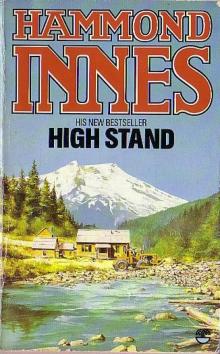 High Stand
High Stand The Doomed Oasis
The Doomed Oasis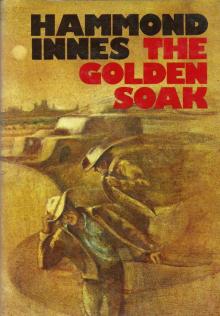 Golden Soak
Golden Soak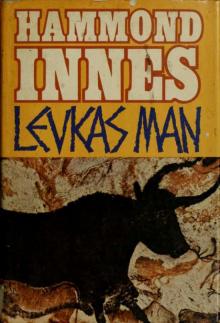 Levkas Man (Mystery)
Levkas Man (Mystery) The Strange Land
The Strange Land Dead and Alive
Dead and Alive Attack Alarm
Attack Alarm The Strode Venturer
The Strode Venturer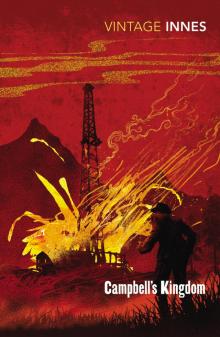 Campbell's Kingdom
Campbell's Kingdom North Star
North Star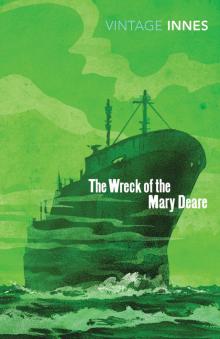 The Wreck of the Mary Deare
The Wreck of the Mary Deare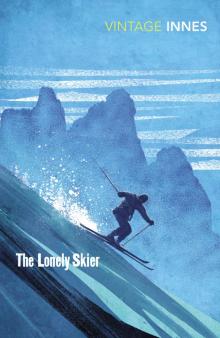 The Lonely Skier
The Lonely Skier The Black Tide
The Black Tide The Trojan Horse
The Trojan Horse Medusa
Medusa Air Bridge
Air Bridge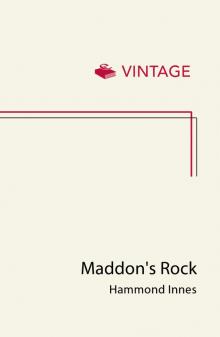 Maddon's Rock
Maddon's Rock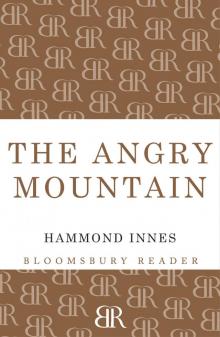 The Angry Mountain
The Angry Mountain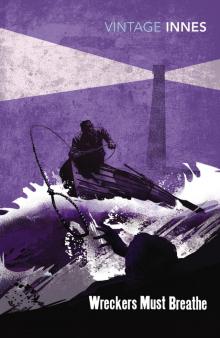 Wreckers Must Breathe
Wreckers Must Breathe Solomons Seal
Solomons Seal The White South
The White South